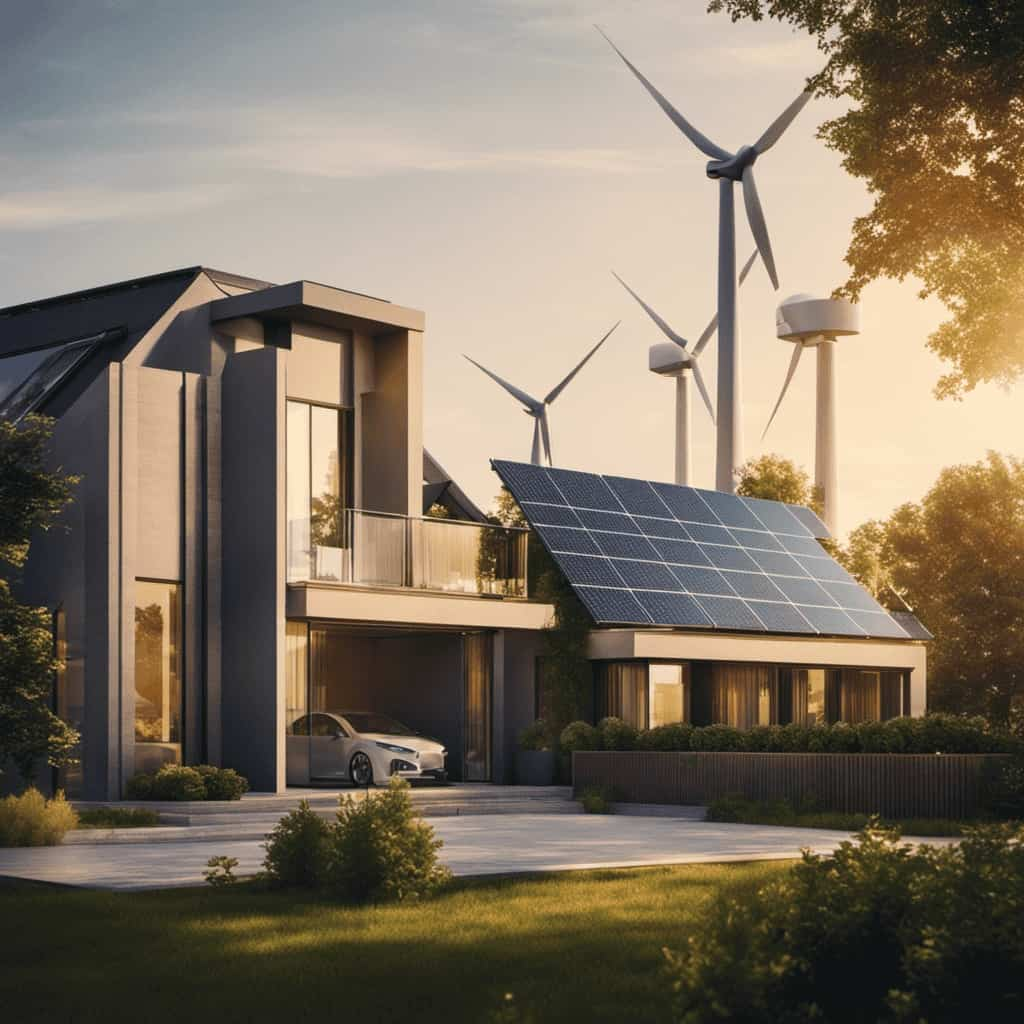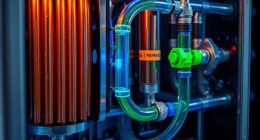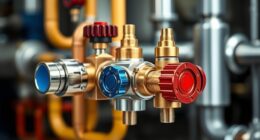We’ve all been educated about renewable energy and its ability to sustainably power our world. But are you aware of the secret weapon behind it all? Introducing heat pumps.
These innovative devices maximize the potential of renewable energy systems, ensuring optimal efficiency. With their energy efficiency ratio (EER) and various key factors at play, high efficiency heat pumps are revolutionizing the way we harness and utilize renewable energy.
In this article, we’ll explore the ins and outs of heat pumps and their undeniable benefits in renewable energy applications.
Key Takeaways
- Heat pump efficiency is measured by the coefficient of performance (COP), which is the ratio of heat output to energy input.
- Factors that impact heat pump efficiency include proper sizing and installation, regular maintenance, and advanced technologies like variable-speed compressors and smart controls.
- Integration of heat pumps in smart grid systems allows for efficient energy demand management, minimizing waste and maximizing renewable energy utilization.
- High efficiency heat pumps provide significant benefits in renewable energy applications, maximizing energy savings and reducing environmental impact.
The Importance of Heat Pump Efficiency in Renewable Energy Systems
We understand the significance of heat pump efficiency in renewable energy systems. Optimizing heat pump performance is crucial for enhancing energy savings through heat pumps.

Heat pump efficiency refers to how effectively a heat pump converts energy input into useful heating or cooling output. It’s measured by the coefficient of performance (COP), which is the ratio of heat output to the energy input.
To maximize efficiency, several factors must be considered. These include proper sizing and installation, regular maintenance, and utilizing advanced technologies such as variable-speed compressors and smart controls.
Additionally, optimizing the heat pump’s refrigerant charge and airflow can greatly impact its efficiency. By focusing on these aspects, we can ensure that heat pumps operate at their peak performance, providing significant energy savings and reducing environmental impact.
How Heat Pumps Maximize Renewable Energy Potential
Maximizing renewable energy potential involves harnessing the efficiency of heat pumps. Heat pump technology advancements have played a crucial role in maximizing the potential of renewable energy sources. These advancements have improved the efficiency and performance of heat pumps, making them more reliable and effective in converting renewable energy into usable heat or cooling.

One key aspect of maximizing renewable energy potential is the integration of heat pumps in smart grid systems. By connecting heat pumps to smart grids, energy demand can be managed more efficiently, ensuring that renewable energy sources are utilized optimally. Smart grid systems can analyze energy consumption patterns and adjust heat pump operations accordingly, minimizing energy waste and maximizing the utilization of renewable energy.
The integration of heat pumps in smart grid systems is a significant step towards achieving a sustainable and efficient renewable energy future.
Understanding the Energy Efficiency Ratio (EER) of Heat Pumps
Our understanding of the Energy Efficiency Ratio (EER) of heat pumps is crucial in assessing their efficiency and determining their effectiveness in converting energy into usable heat or cooling. The EER is a metric used for measuring heat pump performance and evaluating energy consumption. Here are some key points to consider:
- EER is calculated by dividing the cooling capacity of the heat pump by the energy it consumes.
- A higher EER indicates a more efficient heat pump, as it can produce more cooling or heating per unit of energy consumed.
- The EER is typically measured at specific outdoor and indoor temperatures to provide a standardized comparison.
- When evaluating the EER of a heat pump, it’s important to consider factors like climate, insulation, and system sizing to ensure accurate performance assessments.
Understanding the EER of heat pumps allows us to make informed decisions when it comes to selecting energy-efficient systems and reducing our overall energy consumption.

Key Factors Affecting the Efficiency of Heat Pumps in Renewable Energy Systems
To ensure optimal performance and energy savings, it’s important to consider key factors that affect the efficiency of heat pumps in renewable energy systems. Several factors can impact the performance of a heat pump, including the size and capacity of the unit, the insulation and airtightness of the building, the quality of the installation, and the climate conditions in which the heat pump operates.
The size and capacity of the heat pump are crucial factors to consider. An undersized heat pump may struggle to meet the heating or cooling demands of the building, leading to decreased efficiency. On the other hand, an oversized heat pump may cycle on and off frequently, resulting in energy wastage and reduced performance.
The insulation and airtightness of the building also play a significant role in heat pump efficiency. A well-insulated and airtight building minimizes heat loss or gain, allowing the heat pump to work more efficiently and maintain a comfortable indoor environment.
The quality of the installation is another critical factor. A poorly installed heat pump can lead to duct leaks, improper refrigerant charge, and other issues that can significantly decrease the efficiency of the system.

Lastly, climate conditions impact the performance of heat pumps. Cold climates can reduce the efficiency of air-source heat pumps, while geothermal heat pumps are less affected by extreme temperatures.
Exploring the Benefits of High Efficiency Heat Pumps in Renewable Energy Applications
By increasing energy efficiency and reducing greenhouse gas emissions, high efficiency heat pumps offer numerous benefits in renewable energy applications. These benefits include:
-
Reducing carbon emissions: High efficiency heat pumps utilize clean and renewable energy sources, such as electricity or geothermal heat, to heat or cool spaces. By doing so, they significantly reduce carbon emissions compared to traditional heating and cooling systems that rely on fossil fuels.
-
Cost savings: High efficiency heat pumps are designed to deliver more heat or cooling output for each unit of energy consumed. This increased efficiency translates into significant cost savings on energy bills over time.

-
Versatility: High efficiency heat pumps can be used for a wide range of applications, from residential heating and cooling to commercial and industrial applications. They can even be used for water heating, further maximizing their energy-saving potential.
-
Long lifespan: High efficiency heat pumps are built to last, with many models having a lifespan of 15-20 years or more. This longevity ensures that the initial investment pays off over the long term, providing consistent energy savings and a reduced environmental impact.
Frequently Asked Questions
Are Heat Pumps Suitable for All Types of Renewable Energy Systems?
Heat pump compatibility with different types of renewable energy systems depends on factors such as heat source availability and system design. Maximizing heat pump efficiency requires careful consideration of these factors to ensure optimal performance.
What Is the Average Lifespan of a Heat Pump in a Renewable Energy System?
The average lifespan of a heat pump in a renewable energy system is typically around 15-20 years. This long-lasting technology offers efficiency benefits that make it a valuable investment for sustainable energy solutions.

Do Heat Pumps Require a Lot of Maintenance and Servicing?
Heat pump maintenance and servicing are important factors to consider. Regular maintenance ensures optimal performance and prolongs the lifespan of the heat pump. It is recommended to schedule professional servicing at least once a year to identify and address any potential issues.
Can Heat Pumps Be Used for Both Heating and Cooling in Renewable Energy Systems?
Yes, heat pumps can be used for both heating and cooling in renewable energy systems. They offer advantages like energy efficiency and contribute to overall energy savings in heating and cooling processes.
Are There Any Government Incentives or Financial Assistance Programs Available for Installing High Efficiency Heat Pumps in Renewable Energy Applications?
Government incentives and financial assistance programs are available for installing high efficiency heat pumps in renewable energy applications. These programs aim to encourage the adoption of heat pumps by providing financial support and reducing the upfront costs for consumers.
Conclusion
In conclusion, heat pumps are the efficient secret to maximizing the potential of renewable energy systems. By understanding the Energy Efficiency Ratio (EER) and considering key factors that affect heat pump efficiency, we can harness the benefits of high efficiency heat pumps in renewable energy applications.

With their ability to optimize energy usage, heat pumps offer a sustainable solution for heating and cooling needs. Embracing this technology will undoubtedly contribute to a greener and more energy-efficient future.









